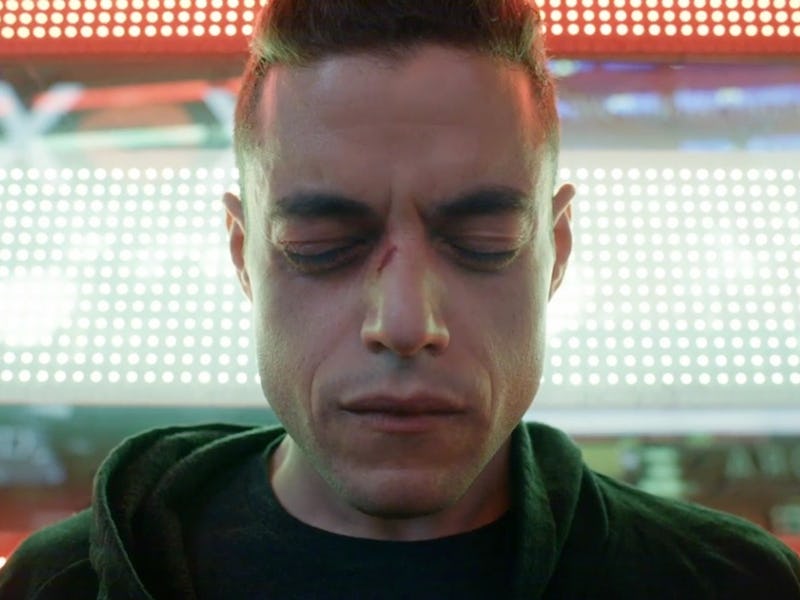Why Mr. 9x Loves Mr. Robot
We asked real-life hackers (with crazy-ass pseudonyms) to weigh in on USA's hit series.

When Mr. Robot premiered on USA last summer, the hacking community was worried. While the 13-episode season racked up critical acclaim for its acting, cinematography, direction, and mind-bending writing, it won over the hacking community mere minutes into the pilot. As the show’s second season heats up, Inverse asked programmers at the Eleventh Hackers on Planet Earth Conference in New York City what they thought of the show. In short, they said it was fucking awesome.
“I think it’s fantastic,” says a hacker who goes by the handle Mr. Nynex, or Mr. 9x. “It’s low-budget but it’s done wisely.” Most of the HOPE conference’s attendees are happy to talk, but just like Elliot/Mr. Robot, they prefer to go by screen names or monikers: to protect their identities. “There aren’t any other techie shows done with that level of attention to detail,” Mr. 9x adds.
It’s the attention to detail that sets Mr. Robot apart. Before Mr. Robot, computer hacking in Hollywood was a joke. Producers used it as a deus ex machina to work their way out of plot holes, give nerdy side-characters something relevant to do, and score cheap pop-culture points by taking advantage of the public’s relative ignorance of like, how computers actually worked. Still, Inverse wondered if after 13 episodes of hacking action, the show has resorted to pandering.
“I wouldn’t say it’s for posers,” says a securities research and development worker who wanted to stay completely anonymous. “It’s pretty realistic.”
“I’m very satisfied with the technical scenes,” says “Crash,” a member of the Neg9 hacker collective. “The producers went out of their way to get real security researchers.”
During the first season, writer Kor Adana and ex-FBI consultant Michael Bazzell worked to make the hacks as detailed and accurate as possible. This season, Adana told Inverse he has an entire staff of programmers and consultants dedicated to bringing the online world of Mr. Robot to life on screen. Adana represents the team at the writer’s table, and then assigns specific hacks for the team to re-create on real networks and computers.
“Everyone contributed in this way,” Adana told Inverse. “They respond to me with screenshots or video playback examples of the hack, and then I end up working with animators and our production team to make it fit for our show.”
Elliot staring at a computer screen looking puzzled, which real hackers say is 90% of the job.
“A real hack is often a week’s worth of work looking for vulnerabilities in something and then coding it, and then exploiting it, the same goes for the hacks we do on the show; they are the real thing,” Marc Rodgers, a former hacker who also serves as a consultant on the show on Adana’s team told the *Christian Science Monitor.
Crash’s friend and Neg9 coworkers “Teck” and “Haxim,” agreed. “It’s cool when the computer and hacking screens are distracting because it’s actually real,” Teck said, adding that he often pauses the show to check out easter eggs in the code that shows up on screens in the show. Teck said he spent the first few episodes checking to see if the code on screen was gibberish, before realizing, “no, shit, that would really work.”
We have no idea what this means, but reliable sources say it's all 100% on the money.
In one scene, HackerTarget explains that all of the programming language on screen is a realistic hack for breaking into a CAN bus system — the exact kind of closed network that runs most of the electrical and computer systems in cars and other vehicles.
But there’s more to hackers than just 0s and 1s. Some of the HOPE conference attendees saw more than just their careers reflected on screen.
“The druggie aspect of Elliot is interesting,” Teck said. “You do see a lot of that in the hacking community.”
In the show, the Rami Malek’s protagonist Elliot is a functioning (or nonfunctioning) morphine addict, and several characters use or abuse various drugs throughout the show.
Elliot smokes weed frequently, but his main drug of choice is morphine or other heavy opiates.
Malek’s character also struggles with mental illness, to the point where Elliot’s mental state is a major plot point. From a storytelling standpoint, Teck said he enjoyed this immensely.
“I’m a big fan of shows or movies who use an unreliable narrator,” Teck said, “My wife and I really didn’t see the twist coming.”
But unfortunately, what makes for a good narrative device doesn’t always fairly represent the show’s audience. One of the only criticisms leveled at the show was that Eliott’s mental anguish and notable social deficiencies furthered stereotypes of the hacking community.
“I’ve heard people saying it [Mr. Robot] still portrays hackers as weird. Like, not normal people,” said Tyler, a software developer attending HOPE.
Even though digital security has become constant topic of national news, the people behind the keyboards are often still marginalized. For the most part, hackers love seeing their profession and passion accurately portrayed on screen; but Mr. Robot is as much a show about mental illness as it is about cyber crime. Both topics are difficult, nuanced issues, and like any piece of art, its perspective can’t please every viewer. Still, if you’re looking for bugs in the show’s source code, you’ve got quite a task ahead of you.